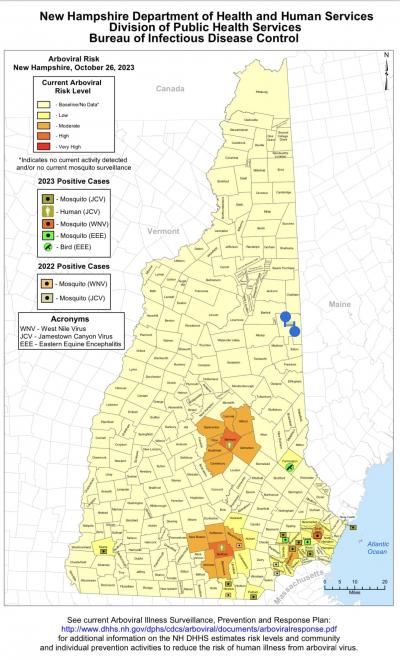EEE Identified in Batch of Exeter Mosquitoes
Exeter, NH - October 30th, 2023: The New Hampshire Department of Health and Human Services has confirmed that a batch of mosquitoes collected on Oct. 17, 2023 in Exeter has tested positive for Eastern Equine Encephalitis (EEE), but despite the finding, Exeter’s threat level remains at low.
This particular mosquito species predominantly bites birds and rarely bites humans.EEE is transmitted through the bite of an infected mosquito that has picked up the virus by feeding on an infected bird. New Hampshire’s most recent human cases of EEE were in 2014.
The risk of contracting the infection is low, but it is a very serious disease. When illness does occur, it happens within 4 to 10 days after being bitten by an infected mosquito. If someone is experiencing the severe neurologic form of EEE with symptoms such as fever, headache, vomiting, diarrhea and seizures, they should be hospitalized immediately. There are no human vaccines to prevent EEE and treatment consists of supportive care. People with compromised immune systems should take extra precautions. Statistics show that EEE is fatal for 30% of people who are infected.
In addition, the town was notified by DHHS that West Nile virus was detected in a batch of mosquitoes in Stratham.
“While the detection of EEE here in Exeter and West Nile virus in a neighboring town doesn’t change our arboviral risk level, which remains low, it’s important that our residents continue to take precautions to prevent infection until the threat eases once colder weather arrives and we see a hard freeze or snow on the ground,” Fritz said.
The best way to prevent infection from EEE and other mosquito-borne illnesses like Jamestown Canyon Virus and West Nile Virus is to prevent mosquito bites. Stay vigilant when you are outside. Protect yourself by using an EPA-approved mosquito repellent, avoid exposure at dusk and dawn when mosquitoes are most active, wear long pants and long sleeves. More information on choosing a repellent and using repellents safely is available on the EPA’s website at https://www.epa.gov/insect-repellents.
Additionally, horses are very susceptible to EEE and should be up to date with their annual EEE and West Nile Virus vaccinations, including a booster. The vaccine has been used successfully in alpacas and llamas. It’s important to remember that you cannot get EEE from a horse. Humans get EEE only through the bite of a mosquito.
In an effort to reduce the mosquito population, residents should continue to remove standing water on your property. Whenever it rains, eliminate mosquito breeding to help reduce the risk. Dump water out of containers such as wheelbarrows, buckets, trash barrels, tarps, boats, canoes, bird baths and any other man made container. Check screens on windows and doors for holes whereby mosquitoes can enter your home.
The town of Exeter contracts with Dragon Mosquito Control for its mosquito control program. While mosquito trapping in Exeter and disease testing at the state lab in Concord has ended for the season, the threat of mosquitoes carrying disease won’t diminish until late fall when a hard freeze is likely or there’s snow on the ground. There are no plans to conduct spraying for adult mosquitoes. All mosquitoes will enter hibernation or die off once temperatures fall below freezing.
For a state-wide map showing current arboviral threat levels and positive cases of mosquito-borne illnesses, visit the NH DHHS website.

